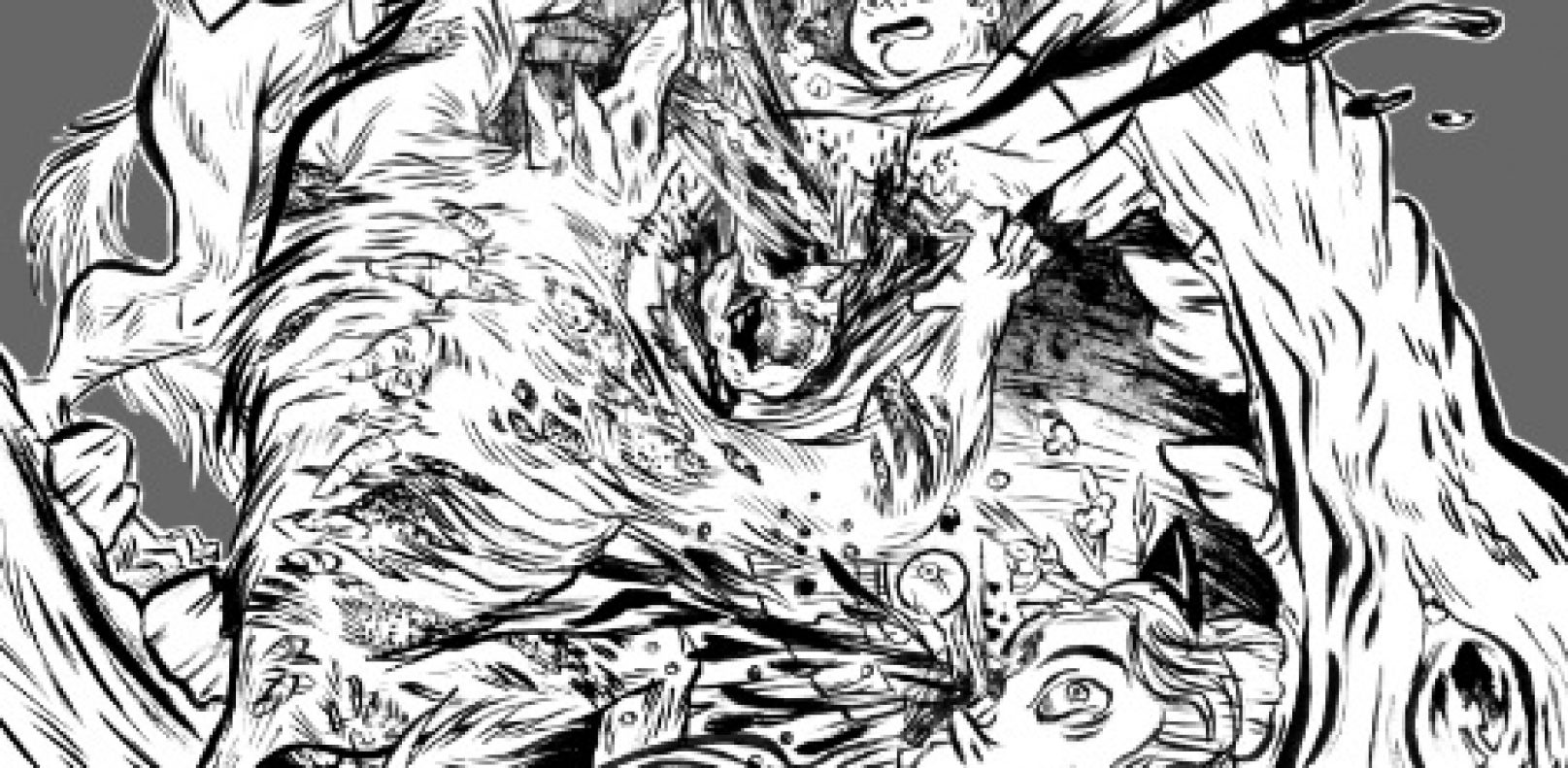Ink Magazine (IM): So to start from the beginning here, what was it originally that got you interested in creative writing for comics? When did that sort of interest begin?
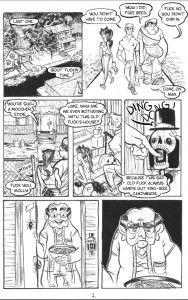 Tres Dean (TD): Well, it’s kind of a tough thing to pinpoint, because telling stories in any format, and also superheroes and comics as a whole, have been a part of my life for a really long time. Literally, I can’t remember I time I wasn’t doing it. In like third or fourth grade I had almost like a repertoire of stories I would tell verbally, and it was almost like performance. It’s like I was telling bedtime stories, but ones that ended with punch lines. And it was the sort of thing where I knew my parents weren’t just humoring me, because they’d bring downstairs from going to bed, and they’d be having friends over, and they would ask me, “Tell them that one story you tell us.” And at the same time I was always into superheroes and comics. I’d come home from daycare and watch the Batman animated series, the Superman animated series… I still own the first comic I ever remember reading for the first time, which was Ultimate Spiderman 1. I’ve read it a hundred times, at least. As for the beginning… do you want to know when I first started writing? Or maybe more when I first starting writing comics?
Tres Dean (TD): Well, it’s kind of a tough thing to pinpoint, because telling stories in any format, and also superheroes and comics as a whole, have been a part of my life for a really long time. Literally, I can’t remember I time I wasn’t doing it. In like third or fourth grade I had almost like a repertoire of stories I would tell verbally, and it was almost like performance. It’s like I was telling bedtime stories, but ones that ended with punch lines. And it was the sort of thing where I knew my parents weren’t just humoring me, because they’d bring downstairs from going to bed, and they’d be having friends over, and they would ask me, “Tell them that one story you tell us.” And at the same time I was always into superheroes and comics. I’d come home from daycare and watch the Batman animated series, the Superman animated series… I still own the first comic I ever remember reading for the first time, which was Ultimate Spiderman 1. I’ve read it a hundred times, at least. As for the beginning… do you want to know when I first started writing? Or maybe more when I first starting writing comics?
IM: I want to hear both. All of it! Start with writing.
TD: Okay, ha, well writing, then. It’s been weird because there have been different types of writing I’ve pursued, like I wanted to write movies for a long time when I started as a freshman. I eventually realized you don’t need to focus on one aspect of it. You need to learn how to tell a good story. It’s weird to think about because… really it’s the only thing I’m good at. And that sounds really self-deprecating, but what I mean more so is that I’m very critical of everything I do, and this is the only thing where while I’m doing it, I’m saying, “I’m good at this. I can make a living off of this.” I really don’t know a time where I wasn’t telling stories in some way, shape, or form. As far as the first time I wanted to write comics, this is all a little bit lengthy, and a little name-droppy, but it’s necessary to it. So, when I as nineteen I went to my first comics convention, HeroesCon, in Charlotte, North Carolina. I’d always entertained the idea of writing comics, but I didn’t know anything about it. I feel like with… music, or filming, there’s set career paths for you to take, you go to film school, or you make a band and post your work online. You tour. Comics were a field where I had no idea where to go with that. But there was an artist there, Chris Roberson. He was writing Superman at the time, he wrote a series called I Zombie… and I went to a discussion panel he did, and I asked during, “This is sort of a basic question… but how do you get a job writing comics?” He told me it differs for everyone. Some start as writers of short films, others maybe start with prose, and move forward from there, but there’s no “proper way” to go about it. So I went to his table later, and he recognized me and said, “Hey, so do you want to write comics?” and I said, “Well, I kind of think I might?” And I mean I was nineteen at the time, so when he asked me to go with him to the bar afterwards and meet his friends and talk with all of them about it, I was just kind of like, “I 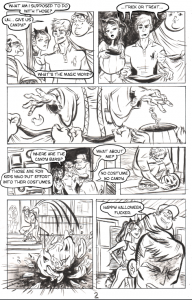 mean… is that allowed? I don’t know if you want to do that.” Ha, but he introduced me to them, and asked me to describe some story ideas I had for movies, and when I did he told me, “Okay, you don’t want to write movies. You want to write comics. What you just describe d to me was a plot of a comic book.” So I had to mull over that, because at the time I really still wanted to make movies, and to an extent I still do. It’s big part of my life in the way I approach storytelling. But I went to another convention that summer in Baltimore, and that’s when he really started shopping me around to people, saying, “this is Tres, he wants to write comics, they’re gonna be big.” I’d never heard somebody talk about me that way, he’d never seen my writing, and he just had confidence in my work. He kind of helped me realize subconsciously that this really was what I wanted to do. And I’ve just sort of been going at it since then.
mean… is that allowed? I don’t know if you want to do that.” Ha, but he introduced me to them, and asked me to describe some story ideas I had for movies, and when I did he told me, “Okay, you don’t want to write movies. You want to write comics. What you just describe d to me was a plot of a comic book.” So I had to mull over that, because at the time I really still wanted to make movies, and to an extent I still do. It’s big part of my life in the way I approach storytelling. But I went to another convention that summer in Baltimore, and that’s when he really started shopping me around to people, saying, “this is Tres, he wants to write comics, they’re gonna be big.” I’d never heard somebody talk about me that way, he’d never seen my writing, and he just had confidence in my work. He kind of helped me realize subconsciously that this really was what I wanted to do. And I’ve just sort of been going at it since then.
IM: So what sort of things act as sources of inspiration for you in your creative writing now, and your work as a whole?
TD: Well I guess I’d break it down from what inspires me in real life, and what works inspire me. I feel like I read interviews with famous writers where they talk about A Tale of Two Cities or something like that is what drives them, and then I read one interview when one said that all those people are liars. No one decides they want to write when they read that. They decide they want to write after they read something when they’re little. So in that case for me the most basic, primal foundations for how I look at storytelling are like… the reason I probably have this sense of humor I do is because I read every Captain Underpants book when I was little. I looked back at them recently and realized, wow, that explains a lot. Uh, Star Wars, which I could go on about for hours. Even as a kid it made me want to do things that were creative, and as an adult, I look at it and think it’s basically Joseph Campbell’s version of A Hero’s Journey told in a blockbuster format. Another from when I was young is the Batman Animated Series, which is in my opinion the best cartoon of all time. That’s a masterpiece in terms of telling good stories in a condensed format. They do so much with only twenty two minutes of story time each episode, it’s amazing. And lot of inspiration in my writing comes from personal experiences in adolescence. Not as much now that I have distance from it. I think a lot of what I write is really influenced by what I want to read. A lot of it contains things that I think seventeen year old me would need to receive. And this summer in New York I went to a comics shop called Forbidden Planet, and I met a guy named Matt there. He was basically the best friend I made in New York that summer. The work he does is really, really impressive. There were days when I would just listen to him talk about story ideas he had, and I’d just go back to my place and just stare and the ceiling like, “God, he’s so great!” Matt’s brilliant and he really inspires me, as well as a couple artist friends here at VCU who really make me want to write something that they would be excited to draw.
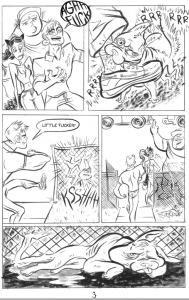 IM: It seems like there’s a lot of personal factors involved in the actual drive and motivation to make pieces for that purpose. Can you kind of elaborate on the source of that motivation?
IM: It seems like there’s a lot of personal factors involved in the actual drive and motivation to make pieces for that purpose. Can you kind of elaborate on the source of that motivation?
TD: Well… I think for a long time, like I said, it was based on high school experience. I was told by a lot of people that I couldn’t do things, or that I wasn’t good enough for certain things. I had a big inferiority complex, basically. And there was a long period of time, for maybe like two and half years out of high school, where none of the work I was putting in was really paying off. It got really frustrating, and I just sort of had to keep going for it. And last year was when my work finally started to pay off. My work started to get noticed, and I ended up getting a job interning with Marvel Comics, in New York for two months. I kept up writing, and in October I went to Comic Con in New York and volunteered with Image Comics, which is probably the best publisher of comics these days. They publish things like The Walking Dead series, and that was a cool experience because I started to meet people who I really admired, who already who I was. And just through networking really hard my work really paid off quickly after that. So I guess my past still really drives me, and there are certain benchmarks I’m always chasing. Certain things I don’t think I could ever write any better than, and that’s out of a sense that I have the utmost admiration for that work, and the two things that come to mind are Scalped, and American Gods and the Ocean at the End of the Lane. If I could write something as good as those, I’m sort of always chasing that. There are also certain career goals I really want to push myself towards… I’m very goal oriented. Like right now, my goal is to get a comic self-published by the end of the year, and that’s in the process of happening. But long term goals like, “I want to write Batman really bad.” I’m always working towards things like that. Now that I’ve gained momentum in terms of writing, and making a career out of it, I don’t want that to slow down. I want that to keep going, keep trying new things and trying to do more with it. I want to write things that make my friends who are all such incredible artists themselves proud to call me a friend and a peer.
IM: So within your work, what sort of recurring themes can you find in your stories and what are the significance of them to you?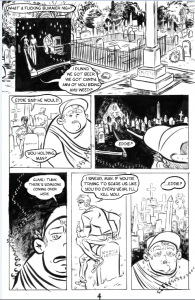
TD: The first that comes to mind is that I write a lot of stories that involve the supernatural, but very rarely is it a straightforward examination of that. I wrote one story called Wolves, and it’s about a werewolf, but what’s really being depicted is this idea of struggling with mental illness and telling people you care about and confiding in them. It’s based on things I’ve dealt with personally with depression and bipolar disorder. But I didn’t want to write about that in a literal sense, and I feel like the supernatural is great to use as a gateway to talk about bigger things. Another is a story called Welcome Back Hartley, and that’s about Post Traumatic Stress Disorder. The source of that was from half-reading a copy of Hell Boy while half-watching the Sylvester Stallone movie Cobra, and I thought, “It would be rad if this dude fought monsters!” But it becomes a story about an ex-military guy whose entire group was decimated by this Minotaur that comes from out of nowhere. He never knew exactly what it was, and now he’s brought in ten years later to deal with all these monsters popping up all over the world. I’m also really interested in a general sense with like, I guess perceptions of masculinity, because I find people writing about these manly-men, Clint Eastwood type characters, and probably because I’m not that super masculine guy I think it’s interesting to find the cracks in that. Like my favorite story I’ve ever written is probably A Ronin’s Tale, about a ronin looking for revenge against the guy who killed his lord. And I like the idea the he feels like the only way can do that is to overtly prove his masculinity by killing another man. I like the idea though that all you need to do to be a quote, “real man,” is to live for yourself and nobody else. The project I have coming up that I’m most excited about it a one shot called The Kill Job. It’s the closest one I’ve written to a deconstruction of that archetype, because it’s about a 1950’s bounty hunter who thinks he’s a Clint Eastwood type, tasked with hunting down a Nazi that escaped the Nuremburg trials. And so there’s this guy who thinks he’s bad, and seen some shit, and then he’s faced with the embodiment of actual pure human evil. And it shakes his belief in himself and what he thinks of himself. And I guess I don’t know if you would call this a recurring theme or motif, but I never want to write something that’s a chore to read. And I constantly keep that in mind while I do my writing.
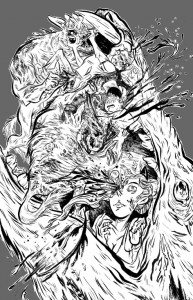 IM: Your stories are all really relatable in a sense because they are about these underlying themes of human problems. Are there any that really resonate with you the most personally, and why do you feel that is?
IM: Your stories are all really relatable in a sense because they are about these underlying themes of human problems. Are there any that really resonate with you the most personally, and why do you feel that is?
TD: Well the one that comes to mind for me is Wolves, because aside from the fact that I have a tumblr, and I blog about me a lot, when I write something like that, it’s very obviously like, “Hey this is obviously about me, and it’s something I’ve been thinking a lot about.” A lot of times when I write a story or comic or screenplay, it’s not me really trying to convey an inner struggle or anything. Which is not to say the work isn’t personal, but it’s not something I’m writing as a way to go about venting. Around November I wrote Wolves, and as I mentioned it’s about me dealing with depression and bipolar disorder. It was for a creative writing class, and while it wasn’t the best feeling in the world, I brought it to peer edits, and we sat down, and got to my story, and I realized, “these people just read something really personal and now they’re about to tell me what was wrong with it.” And that sacred me, which is probably why I avoid writing personal things a lot. But I just got to a point where it was edited enough that I was comfortable posting it on the internet. I don’t have any way to see how many people post it or see it on my Tumblr, but I did get a message from someone telling me, “That’s a story that really resonated with me.”
IM: And what other things you’ve written do you find resonate with other who read your work, in addition to yourself?
TD: Ah… well I wrote something kind of by accident about two years ago about Superman. So. I have really strong ties to Superman and superheroes in general… I was raised Christian, and there were definitely certain periods of time where I believed in that, but it’s never been the most important thing in my life. And while I deeply respect that, I realize that all the stuff that I learned… my moral center… it’s been shaped by superheroes. Like superman movies and TV shows, and reading comics and stuff. And so when I wrote that piece about Superman, I think I meant to write like two sentences, but I ended up writing a couple paragraphs about how the thing to happen to our society in terms of entertainment was having three really good Batman movies, and one awful Superman movie, because it made everyone want to be like Batman. I firmly believe, like when people talk about “What would Jesus do,”my adage is if everyone tried to be like Superman, the world would be a better place. I get really aggravated that people get so fascinated by the dark side of superheroes. I heard someone in class the other day ask another student, “So do you like Marvel or DC?” and the other said, “I like Marvel, DC’s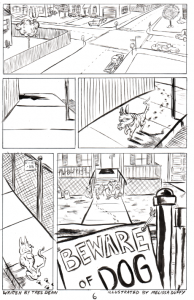 not really dark enough for me.” I mean, I just don’t see what’s wrong with a character like Superman, who can feasibly do anything – he could take over the world in like, half a minute, if he wanted to – buthe’s such a fundamentally good person, that all he does is try to help other people selflessly. I don’t get why people don’t like that. So when I wrote a couple paragraphs about that, and it just blew up on Tumblr. It was just an accident. And I got a bunch of messages from people like, “I never thought about it like that.” Somebody straight up said, “You make me want to be a better person.” It’s funny, any time I tend to go off on superheroes, people tend to give me feedback. I wish people didn’t need them to be dark and broody to be cool. They’re aspirational figures for me, so whenever I talk about it, it feels good when people respond to it. The idea that a superhero has to be dark to be entertaining, that they have to be conflicted to be relatable, that’s why this summer they put out a Superman movie where he kills several hundred thousand people…his fault directly. I’m not nitpicky about small changes. I don’t care if the Spiderman suit isn’t the exact same in the comics and movies. I don’t care if they put nipples on the 1999 version of Batman’s suit. That’s kind of funny. But I have a lot of issue with a movie coming out that disregards the core of the character that has been an aspirational figure to five year olds for seventy five years. And happened all because The Dark Knight convinced people heroes aren’t interesting unless they are super dark and have a lot of problems… I don’t want to relate to Superman. I want to try to be Superman.
not really dark enough for me.” I mean, I just don’t see what’s wrong with a character like Superman, who can feasibly do anything – he could take over the world in like, half a minute, if he wanted to – buthe’s such a fundamentally good person, that all he does is try to help other people selflessly. I don’t get why people don’t like that. So when I wrote a couple paragraphs about that, and it just blew up on Tumblr. It was just an accident. And I got a bunch of messages from people like, “I never thought about it like that.” Somebody straight up said, “You make me want to be a better person.” It’s funny, any time I tend to go off on superheroes, people tend to give me feedback. I wish people didn’t need them to be dark and broody to be cool. They’re aspirational figures for me, so whenever I talk about it, it feels good when people respond to it. The idea that a superhero has to be dark to be entertaining, that they have to be conflicted to be relatable, that’s why this summer they put out a Superman movie where he kills several hundred thousand people…his fault directly. I’m not nitpicky about small changes. I don’t care if the Spiderman suit isn’t the exact same in the comics and movies. I don’t care if they put nipples on the 1999 version of Batman’s suit. That’s kind of funny. But I have a lot of issue with a movie coming out that disregards the core of the character that has been an aspirational figure to five year olds for seventy five years. And happened all because The Dark Knight convinced people heroes aren’t interesting unless they are super dark and have a lot of problems… I don’t want to relate to Superman. I want to try to be Superman.

